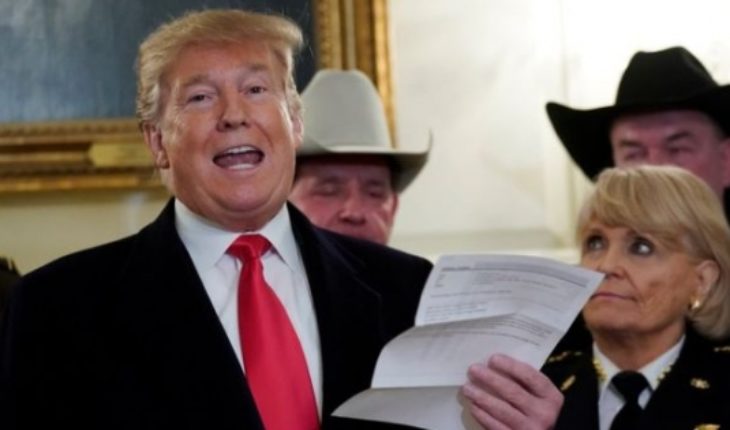“Globalism”, a term which appears frequently in speeches and in criticism of authorities as the President of the United States, Donald Trump, means different things to different people.
The new Minister of Foreign Affairs for Brazil, Ernesto Araújo, for example, globalism is a “current configuration of Marxism”, of which Brazil and the world need to RID.
“It is economic globalization that went on to be controlled by the cultural Marxism,” said the Chancellor on his blog meta 17.
In his speech of the 73rd General Assembly of United Nations, Trump said to reject what it calls “ideology of globalism” which, from his point of view, opposed to its motto of “United States first”.
The steel case that spurred globalization “USA will always choose independence and cooperation over global Governments, control and dominance,” said the President.
“I honor the right of every nation to follow their own customs, beliefs and traditions,” said Trump, adding that his country is “governed by Americans” and that’s why, instead of globalism, he embraces the “doctrine of patriotism”.
But what then is globalism?
Interviewed by BBC Brazil specialists agree that, at other moments in history, the term had a quite different to the current definition, adopted by the new right-wing of the planet.
To these analysts, the term turned into a “political slogan” or a “caricature” and represents, in the approach to the recent debates, ideas opposed to nationalism and patriotism.
Political slogan, the first point that should be noted, says the Belgian linguist Jan Blommaert, Professor of language, culture and globalization in the Tilburg University in the Netherlands, is that the term is “vague, and that’s part of a strategy of political discourse”.
Globalization, for example, is not synonymous with globalization, according to Blommaert, “but is its resemblance to globalization that confuses people and makes you think that they know what they’re talking about.”
The second aspect is that the term, says the Professor, is the ideal “ammunition” for the 21st century, “perfect for social networks”.
“In the world of Twitter is ideal: is a Word with several different meanings and several different applications.” Extensive ideas and arguments are reduced to a word or a phrase”.
Globalism is simply a “political slogan”, it tells you to BBC Brazil Joseph Nye, Professor of international relations at Harvard and one of the fathers of the concept of soft power (soft power, or the ability of a country to influence decisions by s) (or power of persuasion, as opposed to its military power).
Do in which countries of Latin America and the world support more globalization?
But what is meant by “globalization” as a political slogan?
The term “has been used by populist nationalists to condemn elites involved in global trade and international institutions”, says Nye.
These leaders also refer to the “lack of national sovereignty” on particular issues, like immigration and trade, says Heidi Tworek, Professor of history international of the University of British Columbia, in Canada.
Links with the crisis of 2008 to Blommaert, the Word as used now has three meanings: the anti-globalists are against immigration and diversity (“against immigration debates avoid the word racism and replaced it with antiglobalismo” says), governance transnational and, finally, also is left (which is to blame for immigration, diversity and the rise of women, the loss of cultural traditions and values and for the construction of a transnational governance system).
On the other hand, complaints from leaders of right against globalism can have some reason, recognizes Gideon Rachman, columnist for the British newspaper Financial Times.
for him, the use of a term with these meanings is linked to the global financial crisis of 2008.
“At that time, the perception was that there was something wrong with the ‘globalisation ‘project. There was discontent, a stagnation in Europe and the USA, and a feeling that the people who had created the system was that had lost less”, he says.
For this reason, continues, Trump and others took advantage of this.
I.e., if globalization was seen as an economic or technological process, a group went on now to say that behind that phenomenon had an ideology: globalism.
“They say that (globalism) was not inevitable, was not neutral and that is something that can be fought”, said Rachman.
“The globalized world to which we become accustomed is the result of conscious decisions. Ideas can not be seen as purely technocratic and divorced from politics. We have believed that it was technical, to a large extent, but had a political content”.
Now other statements of the Brazilian Chancellor Ernesto Araújo nationalism show that, for him, the term globalization meets, basically, “contrary to the nation” or “contrary to homeland” features.
“Globalism constitutes hatred through several ideological ramifications and its instruments against the nation, contrary to human nature and contrary to the own human birth,” he said in his inauguration speech.
Be Donald Trump and the Brexit halt globalization?
“Do not believe what globalism says when points out that to have economic efficiency is necessary to quell the heart of homeland and not love the country. Don’t listen to globalism when he says that peace means not fighting”, he said.
The concept of “love the fatherland” in opposition to “globalism” is shared by Trump.
In his speech to the General Assembly of the UN in 2018, the US President said U.S. “rejects the ideology of globalism and embraces the doctrine of patriotism”.
Blommaert sums it up thus: globalism means basically “as opposed to the nationalism of the twenty-first century”. The anti-globalists would be nationalists now (because the term nationalism already went out of fashion, says).
Tworek, Professor of British Columbia, points out that, with or without the suffix “ISM” that indicates ideology, the word serves to oppose “nationalism”.
Ideological project and conspiratorial although gives some reason to the leaders who are protesting against concepts who insist with the term globalism, Gideon Rachman, the Financial Timeshighlights the fact that there is an ideology behind the conception of a world with a global economy that is integrated as the of today, does not mean that there was any conspiracy to do so.
And right, says, emphasizes that so-called “conspiratorial” aspect.
“Putin, China, the European Commission, Tony Blair and Bill Clinton had a similar vision, of free trade, committed to the idea of an integrated global economy,” he says. “The triumph of ideology was that we do not perceive that it was an ideology, seemed something that made sense.”
And already then there was opposition.
Rachman cites as an example the demonstrations in Seattle in 1999, when thousands of people protested against the meeting of the World Trade Organization (WTO).
Or even the independence of central banks: “all those who were wise said that the money should be administered by technocrats. But now there is criticism of those ideas, like making Trump.”
Or Rosenboim, Professor of modern history at the City University of London and author of the book “The emergence of globalism”, says that Trump and other leaders “pretend” protest against this neoliberal globalism.
In his view, globalization is “the idea that the policy should be adjusted to globalization or cultural and economic conditions of an interconnected world”.
But that doesn’t mean that all the globalists have the same values or objectives within the global order.
Trump and other leaders, according to Rosenboim, used rhetoric to apparently protesting against a specific type of globalism or neoliberal globalism, or one that prioritizes global economic interests on other interests.
The question, says, is that even if they use that rhetoric, the leaders of right not are talking really about globalism.
China: the speech that Xi Jinping, the leader of the Communist giant, became in Davos in the last great defender of globalization “Is more a fake version or a caricature of globalism,” says.
“They claim to be against the idea of that 1% of the rich of the world will make money with this new interconnection capacity,” explains Rosenboim.
“But there are lot of rhetoric and a little trap for appealing to people ignored by the neo-liberal market.”
“The neo-liberal globalization exists, but they do not protest against that. They are protesting against a cosmopolitan liberal elite, not necessarily against the persons or institutions responsible for establishing such a market”.
Globalism from now, cosmopolitanism yesterday the term globalization is not new. And before, I had other meanings.
With the change of the 19th century to the 20th century, says Blommaert, emerged a new culture linked to urbanization.
“A feeling that we were losing our traditions, that a new more apathetic mentality, that was affecting us consumerism had appeared”.
What defined those people with this new mindset was the term cosm or politan in English (or cosmopolitan, in Spanish).
The American magazine Cosmopolitan, for example, was born in 1886. Already at that time, says Blommaer, the term globalist It was used in alternation with cosmopolitan .
According to Rosenboim, in the 1940s, after World War II, “thinkers and intellectuals of the West tried to think a post-war world, concerned about the return of totalitarianism and militarism, and recognizing the interconnectedness of the world provided by” transport and communication technologies “.”
Thus, they thought of how the policy could be done globally and in how it values such as welfare and equality were global, not linked to a single country.
In this way, explains the author, would have arisen globalism in the sense that she studied: policy which must adapt to globalization.
On the other hand, for Blommaert was in the 1960s – to the colonies in the world and with large media events such as the moon landing and the war in Viet Nam-who changed the way how the world imagined.
“It was then that we will see the world as an interconnected system and emerged the notion of the global.”
“We began to feel that we lived in a global world, formed by States and areas with the same people,” he says, also citing “leaders and global icons” which became known all over the world a little earlier as Gandhi, Mao Tsé Tung and Fidel Castro.
For Rosenboim, “globalism was seen as something good or bad, but as something necessary to respond to the new reality. Something like: ‘We need globalization, or are going to be left us behind’ “.”
Anti-Semitism but the same word cosmopolitan was used as something negative and anti-Semite before 60.
So it was in nazi Germany and Stalin’s Soviet Union, according to Blommaert.
They used it to describe “innate” characteristics of the Jews, that would not have Germanic roots in the case of Germany.
For Stalin, “rootless cosmopolitanism”, or the Jews, it represented a danger to Soviet sovereignty.
Some see echoes of the anti-Semitic meaning of cosmopolitan in the new meaning of globalism in the 21st century.
The greater symbol of globalism, said antiglobalista, who is George Soros, a Jewish entrepreneur hungaro-estadounidense of 88 years.
Who is George Soros and is why white hatred of the far right and the Conservatives of the United States (and other countries) born in the Nazi-occupied Hungary, emigrated to the United Kingdom in his teens. Today, it is an investor and philanthropist who invests in liberal and progressive causes around the world.
“He has no roots and is linked to international NGOs, it is a typical globalist” says Blommaert.
“It’s a Jew that, again, is seen as dangerous,” he concludes.
translated from Spanish: What is “globalism”, the ideology that, according to Trump and other world leaders, is opposed to the “love of country”
February 13, 2019 |





